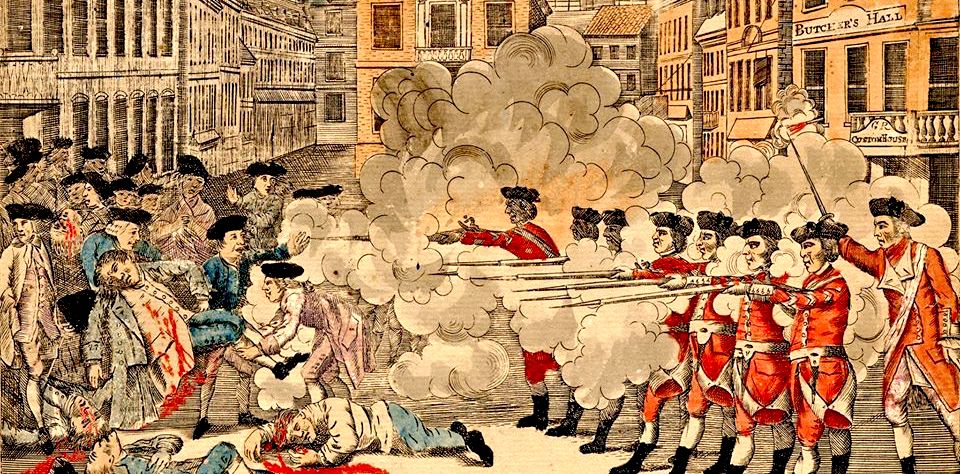About Publications Library Archives
cthl.org

Preserving American Heritage & History

Preserving American Heritage & History


Author: Deacon John Tudor
Date:1770
Annotation:
By the beginning of 1770 there were four thousand British soldiers in Boston, a seaport with only 15,000 inhabitants. On the evening of March 5, crowds of day laborers, apprentices, and merchant sailors began to pelt British soldiers with snowballs and rocks. A shot rang out, and then several soldiers fired their weapons; when it was over, five civilians lay dead or dying, including Crispus Attucks, a mulatto merchant sailor. A firsthand account of the Boston massacre, by the Deacon John Tudor (1709?-1795), follows.
At a trial later that year, John Adams defended the soldiers in a belief that the men had a right to effective legal counsel. Convinced that America should not lose the moral advantage of showing that the soldiers could receive a fair trial, Adams also wanted to remind Bostonians of the “Dangers…which must arise from intemperate heats and irregular commotions.” Adams obtained deathbed testimony from one of the five men who had been mortally wounded by the British soldiers, who swore that the crowd, not the troops, were to blame for the massacre. As a result of this testimony, all but two of the soldiers were acquitted and the worst punishment any of the soldiers received was a branding on the thumb.
Document:
March [1770]
On Monday Evening the 5th current, a few Minutes after 9 O’Clock a most horrid murder was committed in King Street before the Customhouse by 8 or 9 Soldiers under the Command of Capt[ain] Tho[ma]s Preston draw from the Main Guard on the South side of the Townhouse.
March 5th
This unhappy affair began by Some Boys & young fellows throwing Snow Balls at the sentry placed at the Customhouse Door. On which 8 or 9 Soldiers Came to his assistance. Soon after a Number of people collected, when the Capt commanded the Soldiers to fire, which they did and 3 Men were Kill’d on the Spot & several Mortally Wounded.
The Capt soon drew off his Soldiers up to the Main Guard, or the Consequences might have been terrible, for on the Guns firing the people were alarm’d & set the Bells a Ringing as if for Fire, which drew Multitudes to the place of action.
Lieut. Governor [Thomas] Hutchinson, who was commander in Chief, was sent for & Came to the Council Chamber, w[h]ere some of the Magistrates attended. The Governor desired the Multitude about 10 O’Clock to separate & go home peaceable & he would do all in his power that Justice should be done &c….
The people insisted that the Soldiers should be ordered to their Barracks 1st before they would separate, Which being done the people separated about 1 O’Clock….
The next forenoon the 8 Soldiers that fired on the inhabitants were also sent to Jail.
Tuesday A.M. the inhabitants met at Faneuil Hall & after some pertinent speeches, chose a Committee of 15 Gentlemen to wait on the Lieut. Governor in Council to request the immediate removal of the Troops.
The message was in these Words. That it is the unanimous opinion of this Meeting that the inhabitants & soldiery can no longer live together in safety; that nothing can Rationally be expected to restore the peace of the Town & prevent Blood & Carnage but the removal of the Troops: and that we most fervently pray his Honor that his power & influence may be exerted for their instant removal.
His Honor’s Reply was. Gentleman I am extremely sorry for the unhappy difference & especially of the last Evening, & Signifying that it was not in his power to remove the Troops &c &c.
March 6
The Above Reply was not satisfactory to the Inhabitants, as but one Regiment should be removed to the Castle Barracks.
In the afternoon the Town Adjourned to Dr. Sewill’s Meetinghouse [Old South Church] not large enough to hold the people, their being at least 3,000, some suppos’d near 4,000, when they chose a Committee to wait on the Lieut. Governor to let him & the Council Know that nothing less will satisfy the people than a total & immediate removal of the Troops out of the Town….
His Honor communicated this advice of the Council to Col Dalrymple & desir’d he would order the Troops down to Castle William. After the Col. had seen the Vote of the Council He gave his Word & honor to the Town’s Committee that both the Regiments should be remov’d without delay….
March 8
Agreeable to a general request of the Inhabitants, were follow’d to the Grave in succession the 4 Bodies of Saml Gray, Saml Maverick, James Caldwell & Crispus Attucks, the unhappy Victims who fell in the Bloody Massacre.
On this sorrowful Occasion most of the shops & stores in Town were shut, all the Bells were order’d to toll a solemn peal in Boston, Charleston, Cambridge & Roxbery.
The several Hearses forming a junction in King Street, the Theatre of that inhuman Tragedy, proceeded from thence thro’ the main street, lengthened by an immense Concourse of people, So numerous as to be obliged to follow in Ranks of 4 & 6 abreast and brought up by a long Train of Carriages.
The sorrow Visible in the Countenances, together with the peculiar solemnity, Surpass description; it was suppos’d that the Spectators & those that follow’d the corps amounted to 15000, some supposed 20,000.
Note: Capt Preston was tried for his Life on the affare of the above October 24 1770. The Trial lasted 5 Days, but the Jury brought him in
Source: William Tudor, ed., Deacon Tudor’s Diary. Boston: Press of W. Sooner, 1896.